- Best free CRM with available upgrades: HubSpot
- Best enterprise marketing and CRM solution: Salesforce
- Best for social media marketing: Zoho CRM
- Best for team collaboration: monday CRM
- Best for creating email marketing campaigns: Pipedrive
Marketing CRM software is a sales solution that specifically aids businesses in creating and managing lead generation and nurturing through digital or in-person campaigns. Campaigns and strategies you can implement include email marketing, social media marketing, digital content marketing, in-person events, referral programs and so much more. Marketing CRM tools can manage all this, plus track how prospects interact with your content, all while promoting a positive perception of your brand.
Top marketing CRM software comparison
CRM providers typically offer marketing products in tandem with sales tools or they offer marketing features embedded into the sales CRM itself. If your business is looking for a CRM provider with advanced marketing functionality, key features to consider are content generation, such as email templates, integrations and general marketing automations.
PREMIUM: Choosing the right CRM for your organization
Below, I review top sales CRM providers for their marketing expertise and capabilities. My list of the best marketing CRM software providers includes HubSpot, Salesforce, Zoho CRM and others. I list out pricing details, pros and cons, and identify ideal use cases for each to help you pinpoint which provider best fits your marketing needs.
| Software | Marketing automations | Content generation | Integrations | Free version | Starting premium pricing* |
|---|---|---|---|---|---|
| HubSpot | Yes | Yes | 1,500+ | Yes | $15 per user per month |
| Salesforce | Yes | Yes | 7,000+ | No | $25 per user per month |
| Zoho CRM | Yes | Yes | 900+ | Yes | $14 per user per month |
| Monday CRM | Yes | Limited | 150+ | Limited | $12 per user per month |
| Pipedrive | Yes | Yes | 350+ | No | $14 per user per month |
| *Priced when billed annually | |||||
HubSpot: Best free CRM with available upgrades
Star rating: 4/5

HubSpot has a product called HubSpot Marketing Hub that offers both free and paid features. Within the free CRM tool, users can access email marketing, web forms, live chat, ad management and mobile optimization. If your business wants more marketing tools and is in a position to purchase a paid subscription, then multiple currencies, email health insights, social media integrations and adaptive testing are advanced features that are up for grabs.
Pricing
- Free CRM: Free for up to five users with contact management, quotes, live chat and more.
- Sales Hub Starter: $15 per seat per month, billed annually, or $20 when billed monthly. The Starter plan includes all free tools, plus simple automation, e-signature, conversation routing and more.
- Sales Hub Professional: $90 per seat per month, billed annually, or $100 when billed monthly, plus a one-time $1,500 onboarding fee. This plan includes all Starter features and prospecting workspace, playbooks, forecasting and more.
- Sales Hub Enterprise: $150 per seat per month, with an annual commitment and a one-time $3,500 onboarding fee. Users receive all Professional tools, plus advanced permissions, predictive lead scoring, conversation intelligence and lead form routing.
- Marketing Hub Free: $0 per month for up to five users.
- Marketing Hub Starter: $15 per seat per month, billed annually, or $20 when billed monthly.
- Marketing Customer Platform: $15 per seat per month, billed annually, or $20 when billed monthly.
- Marketing Hub Professional: $800 per month, billed annually, or $890 when billed monthly. This includes three seats with additional seats starting at $45 per month.
- Marketing Hub Enterprise: $3,600 per month and includes five seats. Additional seats start at $75 per month.
Features
- A/B testing: Implement adaptive testing of different marketing strategies by receiving real-time feedback and insight into campaign success.
- Web forms: Generate leads directly from your business website by building online forms.
- Marketing campaign management: Align marketing and sales teams by allowing collaboration in one central place.
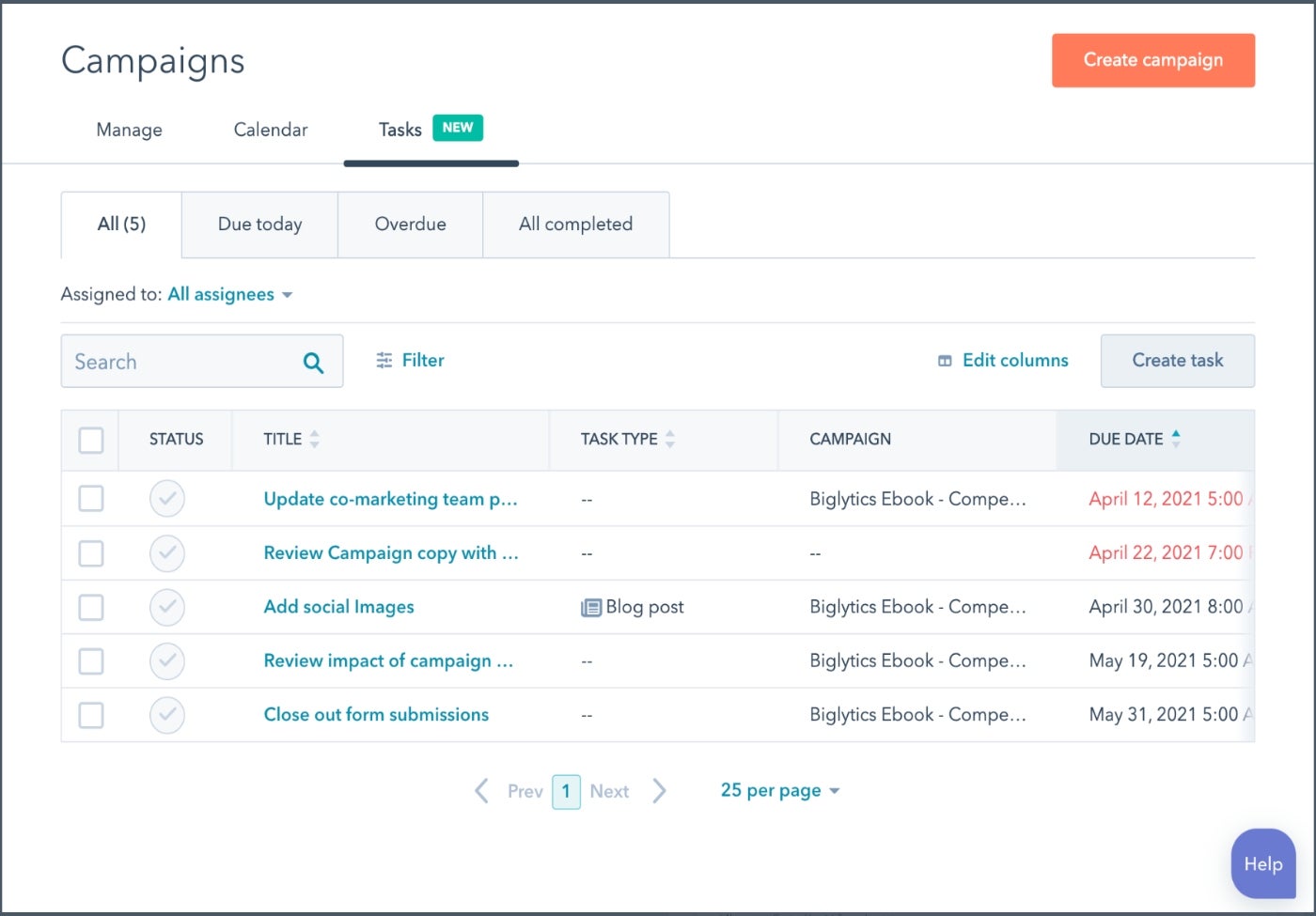
HubSpot pros and cons
| Pros | Cons |
|---|---|
| Users report easy platform setup. | No free trial for paid plans. |
| 24/7 user support for paid plans. | No live support for free users. |
| Offers a variety of free tools and templates. | Users report lacking reporting features. |
Why I chose HubSpot
HubSpot is the ultimate free CRM software for its rich marketing, sales and support features. As a popular provider thanks to its usability and user support, HubSpot can be a great choice for businesses that are new to using a CRM, want an affordable option or aim to level up their lead generation strategies.
HubSpot’s free CRM is extremely useful, but those upgrades can be costly for small businesses. For a free CRM with more affordable premium upgrades, I would recommend checking out Zoho CRM.
For more information, read the full HubSpot review.
Salesforce: Best enterprise marketing and CRM solution
Star rating: 4.1/5
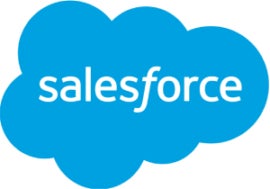
Salesforce is enterprise CRM software built to handle the needs of large organizations. As one of the most flexible sales solutions, Salesforce allows enterprises to add niche elements and custom app integrations. It offers a marketing solution that can organize campaigns and assets and associate them with sales activities. This allows users to accurately communicate ROI to stakeholders and make strategy decisions based on campaign data history with reporting features.
Pricing
- Starter Suite: $25 per user per month, billed annually. Users get account, contact, lead and opportunity management, as well as the mobile app, email integration and more.
- Professional: $80 per user per month, billed annually. The Professional plan includes everything in the Starter Suite plus Sales Cloud, full offline functionality and more.
- Enterprise: $165 per user per month, billed annually. This tier offers opportunity scoring and deal insights plus data synchronization and harmonization.
- Unlimited: $330 per user per month, billed annually. The Unlimited tier includes all features mentioned above plus developer pro sandbox, lead scoring and five campaigns per opportunity.
- Einstein 1 Sales: $500 per user per month, billed annually. This tier includes all Salesforce CRM features like collaboration tools via knowledge shares and Slack and more.
- Marketing Cloud Engagement: $1,250 per organization per month, billed annually. Includes email marketing, content creation and robust analytics.
- Marketing Cloud Account Engagement: $1,250 per organization per month, billed annually. This tier includes up to 10,000 contacts, lead nurturing and scoring, engagement history backboards and campaign reporting.
- Marketing Cloud Growth Edition: $1,500 per organization per month, billed annually. This includes AI-powered emails and campaigns, multi-channel journeys and landing pages.
- Data Cloud for Marketing: $108,000 per organization per year. These subscriptions unify data into a single customer profile with data ingestion, harmonization and insights and predictive analytics.
- Marketing Cloud Personalization: $108,000 per organization per year. Includes web and email personalization, segmentation, rule-based decisioning, A/B testing and reporting and product and content recommendations.
Features
- Content creation and selection: Use generative AI that learns from your brand and campaign data to create copy and visual content.
- SMS messaging: Manage and track SMS messages by sending alerts and transactional messages to customers using templates and a drag-and-drop interface.
- Marketing analytics: Optimize spend and customer engagement by unifying performance data, automate reporting and identify performance opportunities with AI-backed insights.
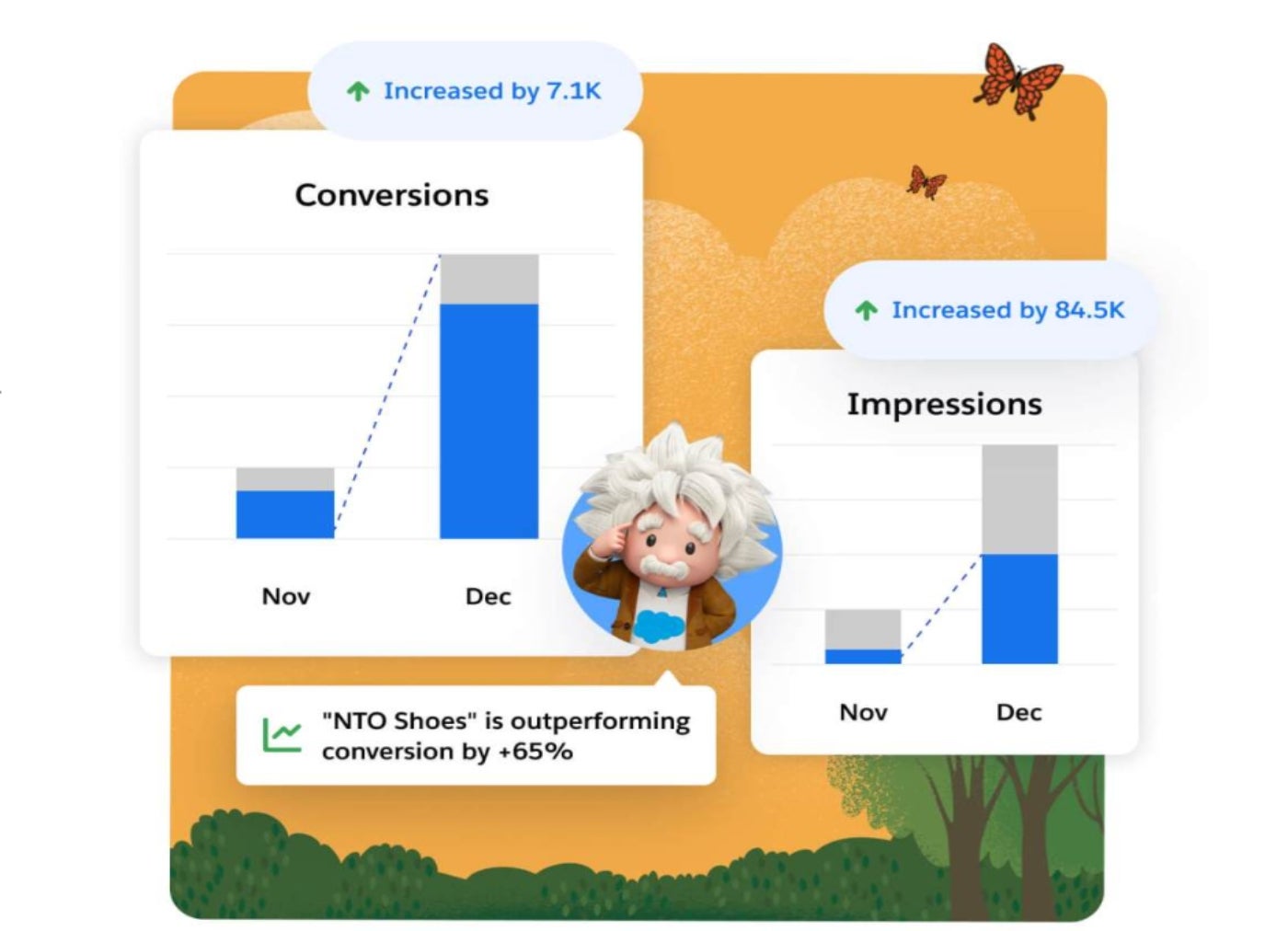
Salesforce pros and cons
| Pros | Cons |
|---|---|
| 30-day free trial. | Users report time-consuming implementation and setup. |
| Provides customizable reports and dashboards. | Software might be too complex for small businesses. |
| Offers powerful automations for marketing and sales processes. | An extensive catalog of features and products can make Salesforce complicated. |
Why I chose Salesforce
Salesforce is another popular CRM that is ideal for teams with complex sales cycles that rely on accurate data to make business decisions. Salesforce has the ability to generate custom CRM reports, display in-depth analytics and produce real-time forecasts. Additionally, its mobile CRM allows reps to access critical data on the go.
If cost is a bigger concern, Zoho CRM offers a fair amount of customization at a much more affordable rate. Though it’s not as flexible a platform as Salesforce, Zoho CRM costs between $14 and $52 per user per month, and a free version is also available. For this reason, Zoho CRM is an inexpensive alternative to Salesforce.
To learn more about this provider, check out our Salesforce review.
Features
- AI email predictions: AI assistant Zia can suggest the best time to contact each lead to get the best results, such as email open rates.
- Real-time notifications: Receive real-time notifications for every client interaction by integrating any app to get all alerts on one platform.
- Automated lead generation: Set up triggers to automatically add new leads or contacts from social media based on their interaction with your brand to cut out manual data entry.
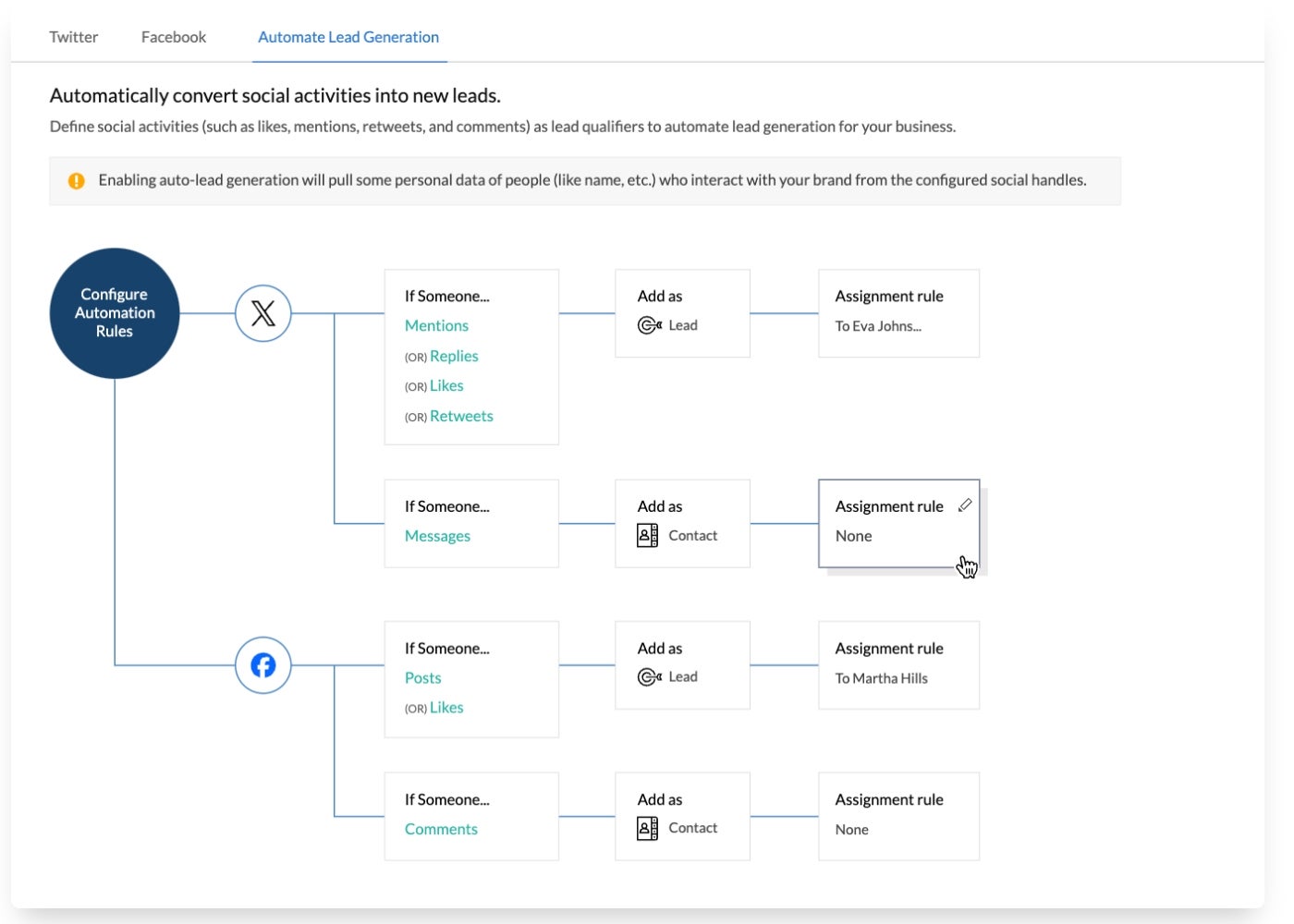
Zoho CRM pros and cons
| Pros | Cons |
|---|---|
| 15-day free trial. | Users report inconsistent customer support. |
| High level of customization options throughout the dashboard. | Add-on features can get pricey. |
| Offers advanced team collaboration features. | Users report a learning curve with the platform interface. |
Why I chose Zoho CRM
Zoho CRM is a leading CRM provider due to its multichannel marketing management, sharp sales tools and affordability. This makes it appealing software for startups or small businesses. If you’re a business already familiar with CRM software and are in need of a tool to help generate and nurture leads, Zoho CRM is a great choice for its moderate learning curve but strong customizations.
Since there are multiple user reports of the Zoho CRM interface being difficult to use, Pipedrive is a suitable alternative for those seeking simplicity. Even though PIpedrive is more expensive than Zoho CRM, all Pipedrive plans include AI sales tools and 24/7 customer support, in addition to an intuitive visual interface.
Head over to our Zoho CRM review for more information on this CRM provider.
monday CRM: Best for team collaboration
Star rating: 3.6/5

monday CRM is a visual CRM platform that offers advanced collaboration tools and colorful dashboards that are simple to set up and use. Any user with permission and access can co-edit and comment in real time. With the clean interface, users can collaboratively organize deals, projects and campaigns on the kanban boards that include assignment tabs, color-coded statuses, document tracking and deadlines.
Pricing
- Free version: Basic CRM offerings only available for students and nonprofit organizations after submitting an application.
- Basic CRM: $12 per user per month when billed annually, or $15 when billed monthly. This tier offers unlimited pipelines, boards and contacts, as well as templates for lead, contact and deal management.
- Standard CRM: $17 per user per month when billed annually, or $20 when billed monthly. This includes advanced account, contact and deal management, two-way email integration with Gmail and Outlook, and AI email generator.
- Pro CRM: $28 per user per month when billed annually, or $33 when billed monthly. This tier includes Sales forecasting, email templates with custom parameters, mass emails and added integrations.
- Enterprise CRM: Contact monday.com for a quote. This level of support offers lead scoring, team goals and advanced analytics.
Features
- Activity management: Log all lead or contact-related activity, such as calls, meetings, notes and more, to know where all communication stands.
- Email composition and rephrasing: Create any type of email or use a template for professional emails.
- Automated task generation: Utilize AI to automate meeting outcomes or marketing strategies into actionable tasks.
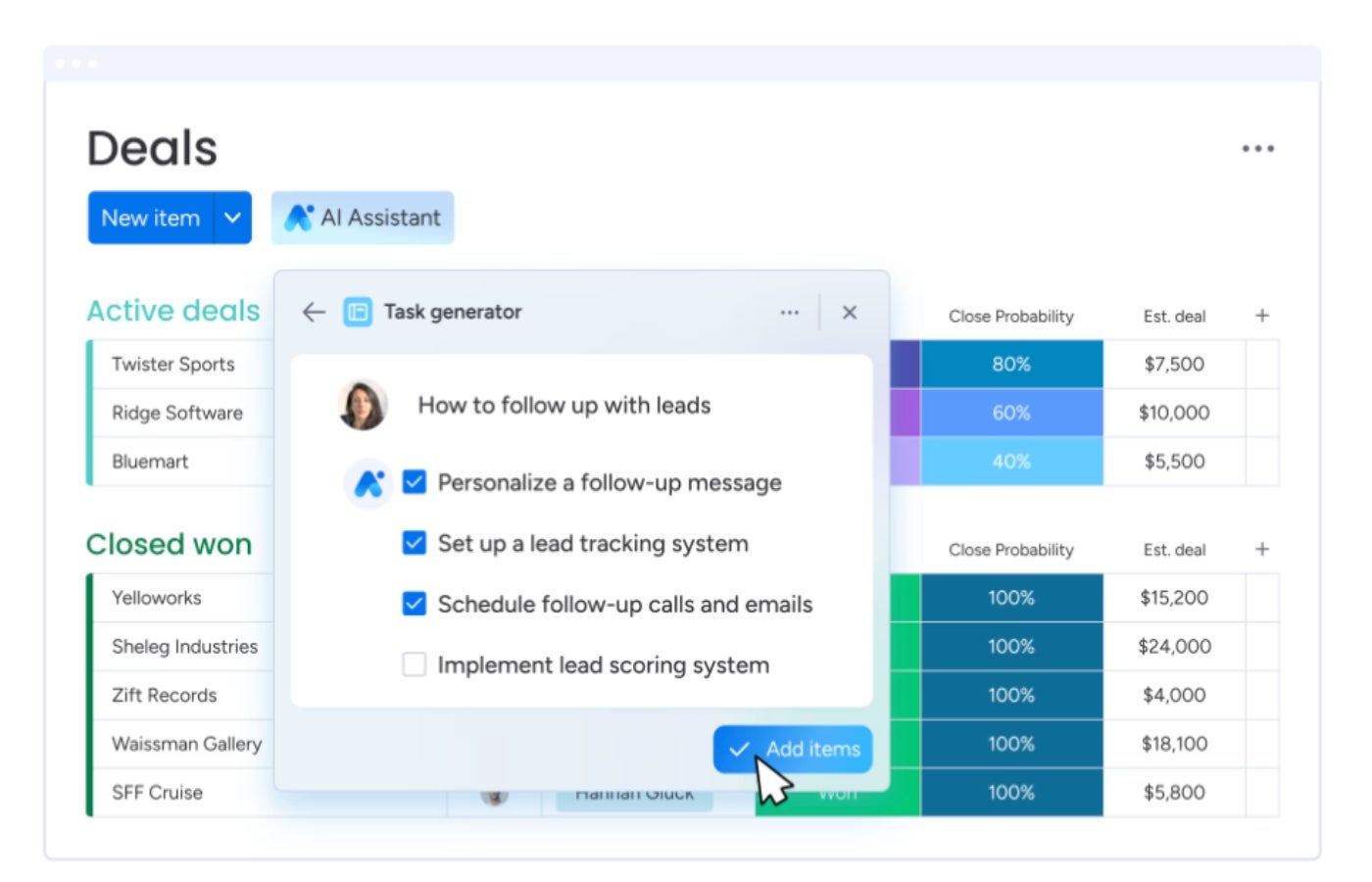
Monday CRM pros and cons
| Pros | Cons |
|---|---|
| 14-day free trial. | HIPAA compliance is only available at the highest paid tier. |
| Can upload unlimited contacts. | Lacks more advanced marketing tools. |
| Offers unlimited custom pipelines. | Doesn’t offer live user support. |
Why I chose monday CRM
Monday CRM is a fully customizable sales platform that can be built without coding knowledge. With its intuitive interface and robust automations, users can save valuable time by automating repetitive work. As a hub for all centralized client communication, reps can efficiently speak with customers through email integrations.
Similar to monday CRM, Pipedrive also offers robust industry specializations and intuitive dashboards. If you’re looking for a tool similar to monday CRM with user-friendly features plus additional email marketing capabilities, I encourage you to look into Pipedrive or Zoho CRM.
Read our monday CRM review for more details on pricing, top features and more.
Pipedrive: Best for creating email marketing campaigns
Star rating: 4.3/5

Pipedrive offers robust email marketing software that helps users send email marketing campaigns to effectively engage with customers. Pipedrive’s campaigns can capture the attention of your ICP with customizable layouts and additional tracking, analytics and filtering features. Users can access the same intuitive drag-and-drop element from the sales CRM to create custom layouts or use a premade template. Reps can see contact information in lead profiles and all email communications on one dashboard.
Pricing
- Essential: $14 per user per month, billed annually, or $24 per user when billed monthly. The Essential plan includes people and organization management, product catalog, sales assistant and more.
- Advanced: $29 per user per month, billed annually, or $39 per user when billed monthly. The Advanced plan offers all Essential features plus automations, two-way email sync, group emailing and more.
- Professional: $49 per user per month, billed annually, or $64 per user when billed monthly. This tier supports all Advanced features and contacts timeline, free Smart Docs add-on, automatic assignment and more.
- Power: $64 per user per month, billed annually, or $79 per user when billed monthly. The Power plan includes all Professional offering plus phone support, 500 custom fields and more.
- Enterprise: $99 per user per month, billed annually, or $129 per user when billed monthly. This tier offers all mentioned features plus up to 180 active automations, unlimited teams and unlimited custom permissions.
Features
- Email builder: Choose from free email templates, import pre-existing HTML or use a drag-and-drop editor to create an email from scratch or modify an existing one.
- Email reporting: Dive into how your audience is receiving your emails with real-time reporting, including open rate, click rate, click-through rate and total/unique clicks.
- Email segmentation: Ensure the right customers are receiving the right email message by creating filtered recipient lists. Use built-in filters such as subscription status, email bounce reason, send data and more.
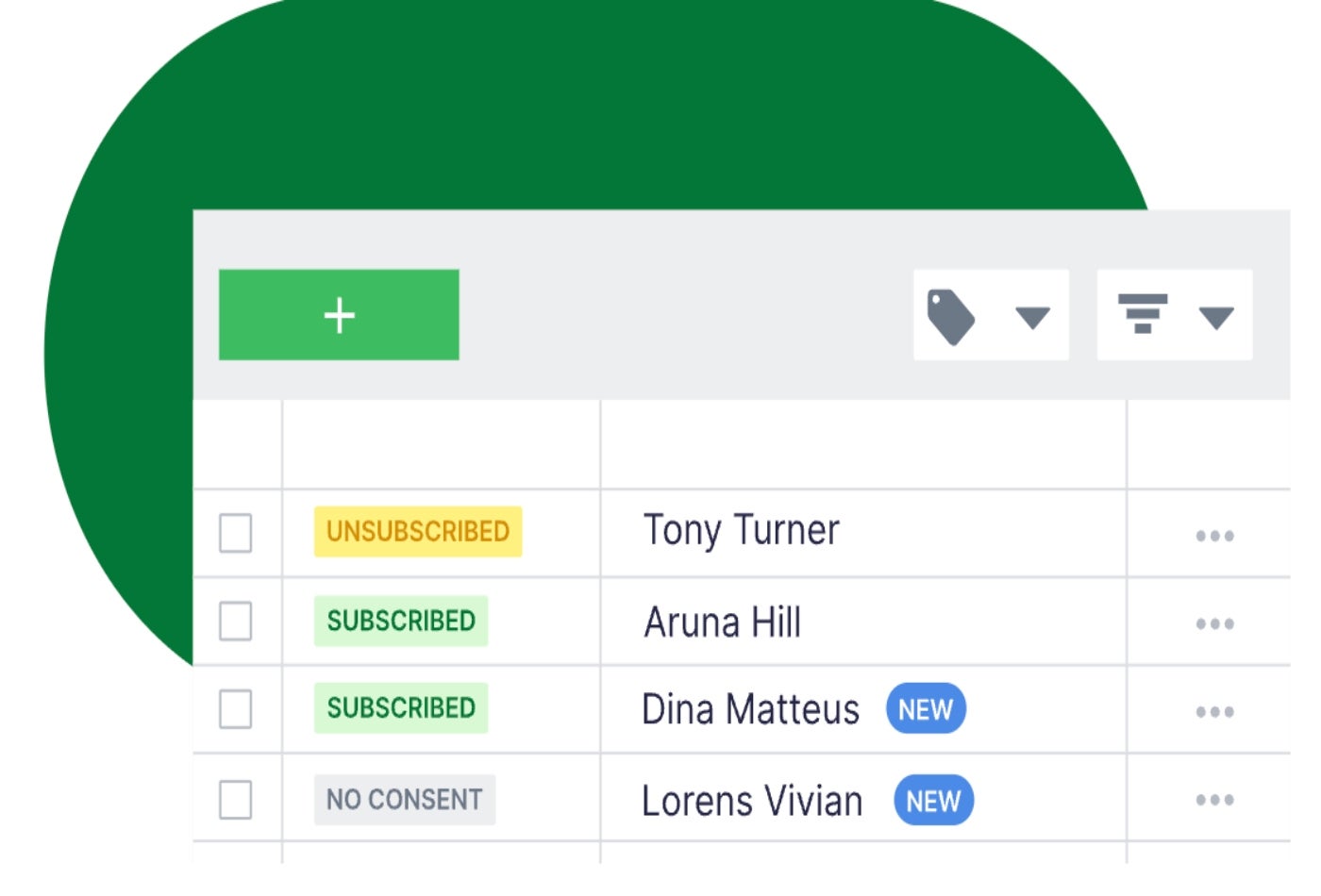
Pipedrive pros and cons
| Pros | Cons |
|---|---|
| 14-day free trial. | Doesn’t offer a free-for-life tier. |
| Intuitive mobile app for iOS and Android. | User reports of limited analytics. |
| Offers 24/7 customer support for users. | No social media marketing tools. |
Why I chose Pipedrive
Pipedrive is a top scoring CRM solution that has made its way onto several of my guides, and for good reason. It is a scalable tool for small businesses up to enterprise level organizations. It also offers extensive in-market expertise for niche industries like automotive sales, government, hospitality and more.
Even though Pipedrive’s premium plans are competitively priced for the mix of marketing and sales features, there is no free tier. If that’s a goal for your business to explore before committing to a paid subscription, I recommend looking into HubSpot or Zoho CRM first.
For more insights, read the full Pipedrive review.
How to choose the best marketing CRM software for your business
Before selecting CRM software, I recommend following best practices to research the software in depth in order to determine if it can provide real solutions for your organization. Starting with the providers on my list, consider signing up for free trials or demos and mapping out each option’s onboarding process with their sales team.
Here are some questions to ask before committing to a paid subscription:
- Does this CRM tool integrate with all of my existing tech tools?
- Does this CRM tool offer the marketing tools that my business needs?
- Are the core sales features offered by this software equipped enough to streamline my sales process?
- How quick is the onboarding process to get started using this tool?
- Can the CRM software scale up to adapt to my growing business?
- Does this CRM tool have any in-market specialization in my industry?
Review methodology
To evaluate each provider’s marketing CRM offerings, I used my in-house rubric with outlined criteria of CRM industry standards. After running each CRM software through this rubric, an algorithm calculates an overall rating, scoring each out of 5 stars. I use those scores and major feature callouts to assign each software an ideal use case that best represents the software’s best offering.
Here’s the exact breakdown of my predefined scoring criteria:
- Cost: Weighted 25% of the total score.
- Core features: Weighted 25% of the total score.
- Customizations: Weighted 15% of the total score.
- Integrations: Weighted 15% of the total score.
- Ease of use: Weighted 10% of the total score.
- Customer support: Weighted 10% of the total score.
Frequently asked questions (FAQs)
What is a CRM model in marketing?
A CRM model in marketing is very similar to the general CRM model for sales and support. It’s a framework that helps users and businesses manage all aspects of customer relationships. A CRM model for marketing includes the processes, technologies and methodologies used to define an ideal customer profile, generate leads that fit that ICP and then retain them. This model will include a structured framework that displays all the steps and strategies from end-to-end sales.
Which is the best CRM for marketing?
HubSpot, Salesforce, Zoho CRM, monday CRM and Pipedrive are the best CRM options for marketing. From this list of providers, determining which can provide the best marketing solution for your business is ultimately up to you. If you want to optimize social media marketing, I would recommend Zoho CRM. If you just want strong email marketing campaigns, I suggest Pipedrive. If you’re looking for AI-powered marketing insights, I’d say Salesforce should be your go-to provider.
What is CRM in e-marketing?
E-marketing is an all-encompassing term for online marketing, which can include email, social media, influencer marketing, affiliate marketing, organic search and much more. A CRM that can monitor e-marketing will come with features such as omni-channel communication, lead segmentation and templates for copy creation.



